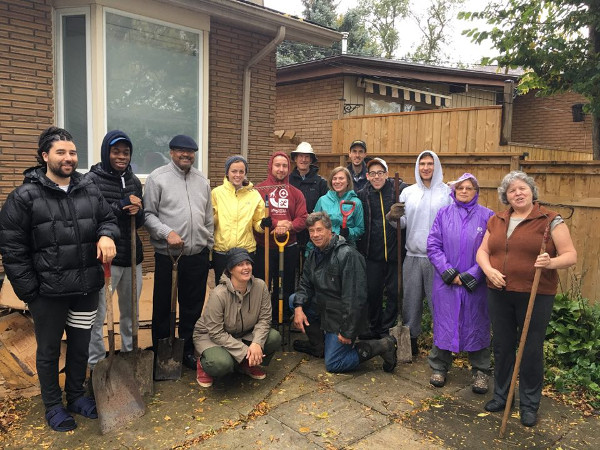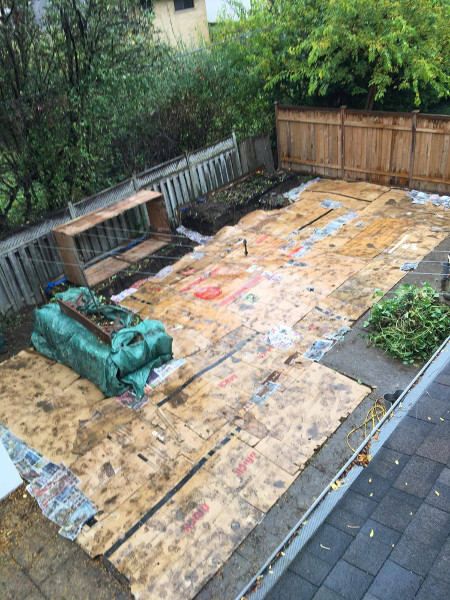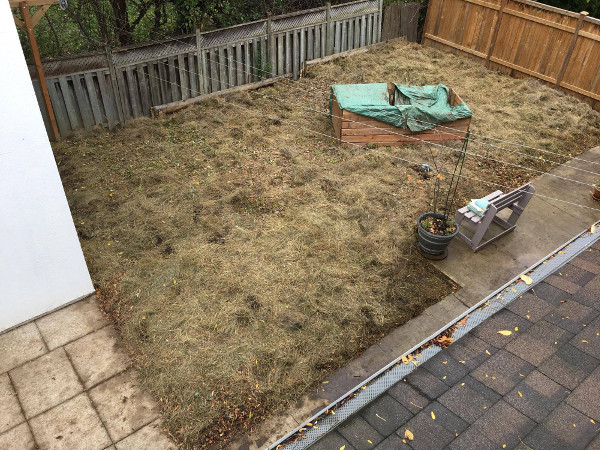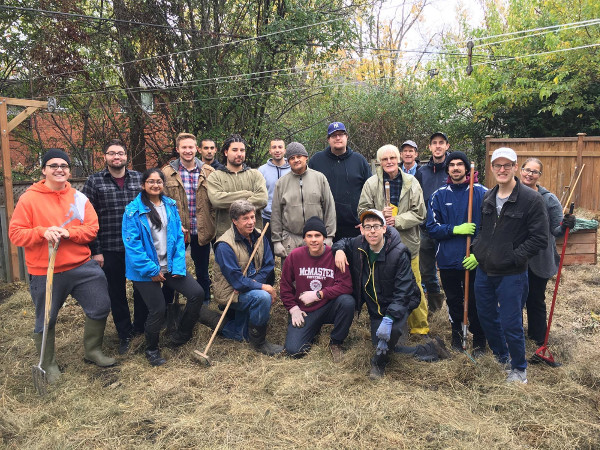A team of volunteers has begun the work of converting a backyard into a permaculture garden of perennial vegetables.
By Adam Chiaravalle
Published November 17, 2017
What happened the first weekend of this November was groundbreaking - both figuratively and literally.

Volunteers
Before I begin this story on the transformative power of permaculture, I have to start from the beginning. What we're talking about here is a garden designed according to the principles of permaculture, a system of agricultural design that applies the same complex web of patterns found in natural ecosystems.
Climate change is irrefutable, and if we do not make changes that fundamentally alter the status quo, we will soon live in world that brings us tremendous daily upheaval.
Climate change became very real for me this year when I graduated from McMaster because all the nights in, all the studying, all the missed outings with family and friends was to create a brighter future. Indeed, climate change throws a boulder into the plan that students should work hard now in order to enjoy a good quality of life.
A line in the movie The Day After Tomorrow captures this. he planet is falling apart and the two main characters, who also happen to be students, are contemplating life. Laura says, "Everything I have ever cared about, everything I have worked for was all in preparation for a future that no longer exists." Pessimism will get us nowhere, but we must understand that the clock on climate change is ticking.
The good news is that climate change is a simple thing to address. Permaculture demonstrates this quite well, as a permaculturalist would say that the solution to climate change need not be intricate nor convoluted. Instead, permaculture's approach is that the solution lies within the problem and thus this makes the solution embarrassingly simple.
Climate change, when it is boiled down into its simplest terms, is the erosion of the nature world. Thus, we have to re-create nature. Permaculture re-creates the natural world through re-thinking how we produce food.
As of right now, our prevailing food system, industrial agriculture, blatantly ignores and divorces human beings and nature from how it produces food. Permaculture looks at food as a social act, because the process of making food is only possible when people are working with each other and the land in a harmonious way.
Permaculture produces food by way of creating an agriculturally productive ecosystem. Producing food in an ecosystem model does more than just grow food, rather it works to ensure the perfection of people. The perfection of people is possible through permaculture because it demonstrates that food goes beyond nourishment, as food is a tool to take care of people, restore the land, enhance bio-diversity, build community, learn about nature and most importantly make change.
In other words, food is something we can use to care for people, the earth and our common future. When we look at food as source of consumption we are missing all the important parts of food, permaculture allows for food to reach its full potential.
I held deep convictions on the powers that permaculture possessed, so I wanted to test it against the judgment of a larger audience. I got the chance to do this at the Ontario Climate Consortium that was held at York University on May 12 and fortunately I came in first place, which came with $1,000 in prize money.
As the summer progressed I learned even more about permaculture and knew that more people need to hear about it. So finally, I got the courage to write an op-ed in the Hamilton Spectator about permaculture and luckily it was published. This was due to the editing and guidance of the very generous Keanin Loomis.
The result was that a lovely person by the name of Cynthia Meyer, who lives near McMaster, contacted my supervisor Dr. Chad Harvey and donated her backyard for us to do a permaculture garden!
I was beyond excited because now we had the land and thus we were able get to the crucial stage of allowing our knowledge on permaculture to yield to action. Without hesitation, I told Dr. Harvey that I was going to use the winnings from the Ontario Climate Consortium and we were off to the races!
Before we knew it, we had assembled a team of community members that were interested in studying permaculture and we had four meetings exploring what permaculture was all about at Cynthia's house.
The two key members of this permaculture study group were Ian Graham, who is a farmer with an immense amount of knowledge on permaculture, and Adrian Hodgeon, who is a masterful permaculture designer. Both of these men are uniquely remarkable and have donated copious amounts of their time to this project, without them this community permaculture project would not be happening.
Soon, the aforementioned groundbreaking weekend was upon us and the task at hand was sheet mulching. The process of sheet mulching is a process that incudes cutting the grass to the lowest level possible, placing cardboard on top of the cut grass, and finally layering manure, woodchips leaves and hay. Sheet mulching is an incredible way to improve soil, the removal of weeds and long term mulching.

Layering cardboard

Hay laid down
In order to sheet mulch Cynthia's backyard we had 20 bales of hay and a trailer full of wood chips and manure to move. So, needless to say we had a lot of work cut out for us. To make matters interesting, the forecast for the prior weekend was rainy so I was a little concerned that we would not get enough people out.
Thankfully, I was dead wrong. As over the course of Saturday and Sunday from 9:30 AM to 2:00 PM, over 35 people came through Cynthia's to help us begin the transformation process.
No matter what the final product of Cynthia backyard permaculture garden ends up becoming, it will be beautiful because it was created by people. It is so interesting that something so simple as being involved in the production of food is so rare, yet so crucial because this connection can spawn countless revelations.
Community was a big part of what happened at Cynthia's this past weekend because people came together in the rain to do something not for individual gain, but for the common goal of improving humanity and our planet.
I do not think it is possible to overstate the power of community here because in order for the world of Academia to make change it must be anchored in the community.
President and Vice Chancellor of McMaster, Dr. Patrick Deane, put it well in his Forward with Integrity address that stated: "rather than relegate community engagement to the status of a 'free floating add-on,' something we do on our own time, we need to integrate it fully and meaningfully into the work of the academe-into our normal activities of exploration, questioning and synthesizing, and subject to the most rigorous academic values."
When academia connects with the community, it can change the world - and this weekend was example of this.

Happy volunteers post-sheet mulch
The picture above says a million words and does not need any explanation. The reason why we are doing permaculture back yard garden is so future generations can grow up in a world that is safe. Now the next stage of the garden is in the spring and we will be planting mainly perennial vegetables.
Sadly, many people do not know about perennial vegetables and this is confusing because they are low-maintenance, highly productive, creators of biodiversity and delicious. The only perennial vegetables that most Canadians know about are asparagus, rhubarb and fiddleheads. However, there are dozens of editable perennial vegetable plants.
Eric Toensmeier encourages us to "plant some perennial vegetables, including beautiful editable trees, shrubs, and vines, and in a few years' time you can become a forger in your own backyard garden of Eden."
As always, if any of you are interested in getting involved in your community, want to take responsibility for your food and learn how to create a food system that restores nature please contact me via email - I would love to hear from you. We are in for an exciting spring! Hope to see you them.
By Kevin (registered) | Posted November 20, 2017 at 10:43:54
Awesome. Well done, everyone.
You must be logged in to comment.
There are no upcoming events right now.
Why not post one?